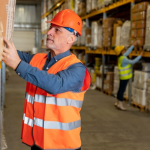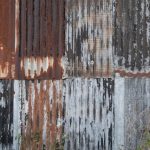
8 Essential Tips for Ensuring Safe Material Handling in Warehouses
February 22, 2024
What is Galvanization? Exploring the details
March 27, 2024Galvanized steel is renowned as a rust-resistant material, prized for its durability and longevity. This makes it an ideal choice for various applications, from construction to automotive industries, making its way into countless products and structures.
But does galvanized steel rust? If you’re wondering if it truly lives up to its rust-resistant reputation, this blog is for you. We’ll delve into the properties of galvanized steel, its manufacturing process, factors influencing its corrosion resistance, and more. So let’s take it from the top.
Understanding Galvanized Steel
Galvanized steel is essentially steel coated with a layer of zinc that protects it from corrosion. This process, known as galvanization, results in a product that is more resistant to corrosion than untreated steel. This is due to the sacrificial protection provided by the zinc coating.
The Galvanization Process
There are two primary methods of galvanizing steel: hot-dip galvanizing and electroplating. In hot-dip galvanizing, steel is dipped into a bath of molten zinc, which bonds with the surface of the steel to form a protective layer.
On the other hand, electroplating involves passing an electric current through a zinc solution, causing zinc ions to adhere to the steel’s surface. Both methods form a zinc coating that shields the underlying steel from rust and corrosion.
How Galvanizing Prevents Rust
Galvanizing deals with the application of a protective zinc coating onto the surface of steel. This process forms a zinc oxide layer on the surface, creating a physical barrier between the steel and its surrounding environment, effectively shielding it from corrosion.
The zinc coating serves as a sacrificial anode, meaning it prevents oxygen and water from reaching the steel. Instead, the zinc reacts with the surrounding environment, like moisture or other corrosive elements. Any corrosion that does occur affects the zinc coating rather than the steel itself. This sacrificial property helps preserve the integrity of the steel structure.
Furthermore, the zinc coating also offers a protective outer coating to the steel substrate. This layer further inhibits rust formation. So overall, galvanization is an effective method for preventing rust and extending the lifespan of steel structures and products.
But Does Galvanized Steel Rust?
Over time, the zinc coating may degrade, possibly due to consistent exposure to harsh environmental factors or mechanical damage. However, this is still better than untreated steel, and in many cases, galvanized steel can remain rust-free for decades, often for 50 years or more.
So, galvanized steel is rather resistant to rust, making it a preferred choice for various applications. The key is to maintain galvanized structures and regularly inspect them for signs of corrosion. This extends their lifespan and mitigates the risk of rust formation. For example, identifying rust spots or peeled coatings enables you to address issues promptly and maximizes the lifespan of the galvanized steel structure.
Factors that Affect Galvanized Steel
As mentioned, galvanized steel is inherently resistant to corrosion. However, several factors can affect its ability to withstand rust, such as the following:
The Thickness of the Zinc Coating
Thicker coatings generally provide better protection against corrosion, as they offer a greater barrier between the steel and the surrounding environment. So, the thicker the zinc layer, the more protection the steel structure has.
Quality of Galvanization
Not all galvanization services are the same. Some are better than others. High-quality galvanized steel offers more defense against corrosion.
Impact of Local Environmental Conditions
Some environmental conditions promote rusting more than others. For instance, exposure to harsh environmental elements such as saltwater, pollutants, and extreme temperatures can accelerate corrosion. In fact, a combination of factors, like high humidity and industrial pollution, can accelerate corrosion. While galvanized steel does offer protection in all conditions, it performs better in moderate, dry environments.
Mechanical Damage
If the zinc coating remains undamaged, it will provide the best protection. Damaging the outer layer with scratches and abrasions can compromise its protective properties, exposing the underlying steel to the environment.
pH Levels
Highly acidic or alkaline environments can corrode zinc coatings more rapidly, diminishing their effectiveness in preventing rust. Neutral environments are the best for galvanized surfaces.
Common Applications of Galvanized Steel
Due to its corrosion resistance and durability, galvanized steel is used across various industries and applications. Common applications include:
- Construction: Galvanized steel is a popular choice for structural components in buildings, bridges, and infrastructure due to its strength and resistance to rust.
- Automotive: Automobiles rely on galvanized steel for body panels, chassis components, and underbody parts to withstand exposure to road salt and moisture.
- Agriculture: Farm equipment, fencing, and storage tanks benefit from the corrosion resistance of galvanized steel, ensuring longevity in outdoor environments.
- Electrical: Galvanized steel is used in electrical transmission towers and utility poles to withstand exposure to weather and environmental conditions
How Long Does Galvanized Steel Last?
In other words, how long do you need it to last? The answer to this question depends on where you intend to use galvanized steel and the environmental conditions it will be exposed to.
Galvanized steel is renowned for its durability and can last for decades in many scenarios, even under harsh conditions. But that can vary from application to application. For structural components in buildings or infrastructure projects, galvanized steel can often provide reliable corrosion protection for 50 years or more. On the other hand, in automotive applications, exposure to road salt and moisture is common. So galvanized steel can typically withstand corrosion for about 10 to 15 years – or longer with proper maintenance. Similarly, in agricultural settings where equipment and structures are exposed to outdoor elements, galvanized steel can offer decades of rust-free performance.
Ultimately, the desired lifespan for galvanized steel should be determined based on the specific requirements and expected usage of the product or structure, with proper consideration given to maintenance practices and environmental factors.
Final Thoughts
I hope by now you have a better understanding of the question – does galvanized steel rust?
While galvanization offers significant protection against corrosion by providing an effective barrier against corrosion, factors such as quality, coating thickness, environmental conditions, and maintenance practices can influence the lifespan of galvanized steel products.
That’s why you should partner with professional steel manufacturers like Midwest Distributors LLC. We only use high-class materials in our galvanizing process and have experienced professionals who know exactly how to get the job done right—making sure you receive more protection against corrosion that will last for years. Contact our company representatives for more information about our comprehensive range of services and products.

